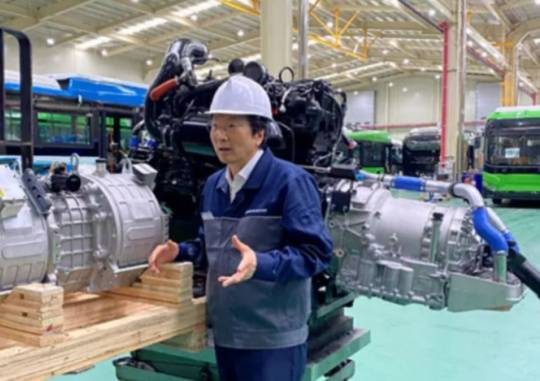Edison Motors to Acquire SsangYong Motor: CEO Kang Young-kwon, "We Will Overcome Tesla"
이 글자크기로 변경됩니다.
(예시) 가장 빠른 뉴스가 있고 다양한 정보, 쌍방향 소통이 숨쉬는 다음뉴스를 만나보세요. 다음뉴스는 국내외 주요이슈와 실시간 속보, 문화생활 및 다양한 분야의 뉴스를 입체적으로 전달하고 있습니다.
[경향신문]

Edison Motors, an electric bus manufacturer, has been selected as the new owner of SsangYong Motor Company. Thus SsangYong Motor just got another opportunity to revive following an acquisition in 2009. But even if Edison Motors acquires SsangYong Motor, challenges are expected before management can return to normal.
On October 20, SsangYong Motor Co. and Ernst & Young Hanyoung Corporation, the accounting firm overseeing the acquisition, announced that they selected the Edison Motors consortium as the preferred bidder and that they would apply for a court approval. If the court approves, SsangYong Motor will sign a binding MOU with Edison Motors and begin due diligence as well as negotiations for the acquisition next month.
Edison Motors, which formed a consortium with the private equity fund, KCGI, and Keystone Private Equity, competed against a consortium led by ELB&T, which specializes in electric cars. Edison Motors had previously offered an acquisition price in the 200 billion won range, which was about 300 billion won less than the offer by ELB&T, but in the process of presenting proof of funds, Edison Motors raised its offer to over 300 billion won.
SsangYong Motor explained, “In addition to the initial acquisition price, when considering the candidate, we put priority on the determination and capability to promote the stable growth of SsangYong Motor Company after the acquisition.” Edison Motors was confident that it could produce highly efficient electric cars with the technology it had developed so far. The company presented a vision following the acquisition of SsangYong and said it would release ten new electric car models by next year and twenty new models by 2025 and achieve a turnaround at SsangYong from red to black in 3-5 years.
Edison Motors is sourcing its acquisition funds from financial investors. Last year, the company recorded sales of 89.7 billion won, but operation profits only recorded 2.7 billion won. This is why some experts argue that Edison acquiring SsangYong is like a shrimp swallowing a whale.
SsangYong Motor has debts reaching 700 billion won including claims for public interest. For the company to restore normal business, it will need an estimated 1.5 trillion won in the next 2-3 years. An industry insider said, “They will need to invest at least two years in researching and developing electrification alone, and the profitability after the transition to eco-friendly vehicles is unclear, which is why the Samra Midas Group withdrew its bid.”
SsangYong Motor still has a strong steady seller, Tivoli, a compact SUV, but other manufacturers have released a series of similar-size models, threatening SsangYong Motor’s image as a prestigious maker of SUVs. Recently, the company exported its first electric car, Korando eMotion, to Europe, but the model was released as a response to the regulations on gas emissions. Besides, the model was not based on an exclusive platform like Hyundai’s Ioniq 5. Lee Ho-geun, a professor of automotive engineering at Daeduk University said, “We couldn’t guarantee success even if they took a bet with SsangYong’s own model. But in the present situation where they lack cash, restoring management to normal does not seem likely without massive layoffs.”
Edison Motors claims it can secure up to 1.5 trillion won by issuing new shares and by taking out loans on security. Kang Young-kwon, chairman of Edison Motors told the reporter over the phone this day, “Our goal is to produce 300,000-500,000 units with internal combustion engines, hybrid cars, and electric cars a year,” and added, “I am confident we can turn SsangYong into a company that can overcome Volkswagen, Toyota and Tesla in terms of design, quality and price.” He dismissed any possibility of intentional layoffs. Kang said, “We have to work in two or three shifts instead of the current single shift to make good cars, if we are to get out of the red. If the workers are willing to work hard, then we will embrace them all.”
Copyright © 경향신문. 무단전재 및 재배포 금지.
- [보수, 죽어야 산다]홍성걸 “제1야당, 꼭 국힘일 필요 없어···한동훈·이준석 말고 새 보수세력
- [속보]코스피 장중 4% 급락, 한때 6000선 내줘···이란 공습 사태 여파
- 이란에 ‘더 센 공격’?···중동 하늘 다 막혔는데 “미국인 당장 출국하라”는 미 국무부
- 조국혁신당, ‘친일 발언’ 이병태 인선에 “재고 요청”…홍익표 “해명 기회 있었으면”
- “그때 말하지 못한 단어, 트랜스젠더”···키라라 수상소감이 남긴 질문
- 기간제 교사들 상대 ‘성폭력’…울산 사립고 간부급 교사 파면
- 냉전 종식 후 30년 만의 파격 선언···마크롱 “프랑스 핵무기 보유량 늘리겠다”
- [속보]조희대 “갑작스런 개혁, 국민에게 도움 되는지 심사숙고 부탁”
- 3000km 날아온 ‘귀한 손님’ 위해 열리는 독수리 식당 [포토다큐]
- 전재수, 부산시장 출마 길 열렸다···민주당 공관위 ‘후보 추가 공모’ 결정